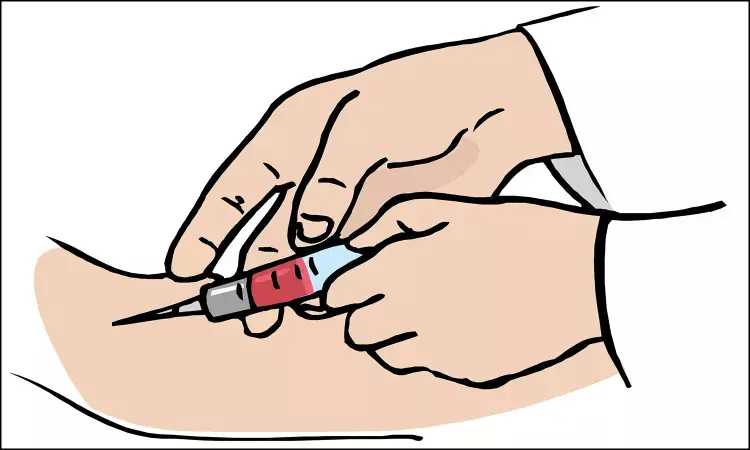- Home
- Medical news & Guidelines
- Anesthesiology
- Cardiology and CTVS
- Critical Care
- Dentistry
- Dermatology
- Diabetes and Endocrinology
- ENT
- Gastroenterology
- Medicine
- Nephrology
- Neurology
- Obstretics-Gynaecology
- Oncology
- Ophthalmology
- Orthopaedics
- Pediatrics-Neonatology
- Psychiatry
- Pulmonology
- Radiology
- Surgery
- Urology
- Laboratory Medicine
- Diet
- Nursing
- Paramedical
- Physiotherapy
- Health news
- Fact Check
- Bone Health Fact Check
- Brain Health Fact Check
- Cancer Related Fact Check
- Child Care Fact Check
- Dental and oral health fact check
- Diabetes and metabolic health fact check
- Diet and Nutrition Fact Check
- Eye and ENT Care Fact Check
- Fitness fact check
- Gut health fact check
- Heart health fact check
- Kidney health fact check
- Medical education fact check
- Men's health fact check
- Respiratory fact check
- Skin and hair care fact check
- Vaccine and Immunization fact check
- Women's health fact check
- AYUSH
- State News
- Andaman and Nicobar Islands
- Andhra Pradesh
- Arunachal Pradesh
- Assam
- Bihar
- Chandigarh
- Chattisgarh
- Dadra and Nagar Haveli
- Daman and Diu
- Delhi
- Goa
- Gujarat
- Haryana
- Himachal Pradesh
- Jammu & Kashmir
- Jharkhand
- Karnataka
- Kerala
- Ladakh
- Lakshadweep
- Madhya Pradesh
- Maharashtra
- Manipur
- Meghalaya
- Mizoram
- Nagaland
- Odisha
- Puducherry
- Punjab
- Rajasthan
- Sikkim
- Tamil Nadu
- Telangana
- Tripura
- Uttar Pradesh
- Uttrakhand
- West Bengal
- Medical Education
- Industry
Novel blood test-A non-invasive diagnostic option to detect CAD

WOBURN, Mass. - A new blood-based RNA Sequencing method to detect Coronary Artery Disease (CAD) powered by SeqLL's tSMS platform has been reported in the September issue of BMC Medical Genomics.The present studies employed RNA sequencing of whole blood to identify an RNA signature in patients with angiographically confirmed CAD.
The new diagnostic plateform may obviate need for invasive procedures like coronary angiography to diagnose CAD in future.
The study, "RNA Sequencing of Blood in Coronary Artery Disease: Involvement of Regulatory T-cell Imbalance", was led by Timothy McCaffery, PhD, Professor of Medicine at the George Washington University (GW) School of Medicine and Health Sciences, with support from a public-private relationship with SeqLL, and support from the St. Laurent Institute and True Bearing Diagnostics, included researchers and physicians from GW as well as Inova Health System (Inova) of Northern Virginia.
Diagnosis of CAD is typically based on coronary angiography, an imaging process used to detect restricted blood flow in the heart's major arteries. Up to 40% of the 1 million cardiac catheterizations performed in the U.S., however, have a "no blockage" test result, despite clinical indications. To improve diagnostic options, Dr. McCaffrey's study used a cutting-edge sequencing method to identify an RNA signature in the whole blood of CAD patients who had received diagnoses via angiographies.
"Using SeqLL's tSMS platform, our team was able to sequence millions of RNA strands per patient at single molecule resolution. This allowed us to reproducibly identify specific RNA transcripts that were altered in patients with coronary disease," Dr. McCaffrey said. He added that "cardiologists were able to collect the blood while the patients underwent angiographic imaging of their arteries."
Between two cohorts, one at GW and one at Inova, Dr. McCaffrey and the research team pinpointed new biomarkers from the identified genes that could lend insight into the cause of CAD. For example, they determined that patients with atherosclerosis had reduced activity of their regulatory T-cells, or suppressor T-cells.
"Accumulating evidence suggests that autoimmunity may play a significant factor in CAD. Based on the gene expression pattern in our studies, it appears as though the patient's immune system becomes stressed, which causes an inappropriate attack on their own arteries," Dr. McCaffrey explained. "This immune connection extends to COVID-19 as well, as patients have experienced heart-related issues following their bouts with the virus. Our results outperformed the conventional clinical prediction model for CAD and using this new method, blood tests for diagnosing CAD could transform health care."
According to the Centers for Disease Control and Prevention, CAD impacts over 18% of adults in the United States age 20 and older and over 665,000 deaths from cardiovascular disease occur annually.
Daniel Jones, SeqLL's CEO, President, & Co-founder, stated, "This publication demonstrates the tSMS platform's ability to produce accurate molecular profiles and generate novel biological insights. This study represents another step toward providing improved, non-invasive diagnostic options to those suffering from coronary artery disease. We at SeqLL strongly support the application of our tSMS platform to the field of cardiovascular health, especially one that impacts so many Americans daily."
https://bmcmedgenomics.biomedcentral.com/articles/10.1186/s12920-021-01062-2
Hina Zahid Joined Medical Dialogue in 2017 with a passion to work as a Reporter. She coordinates with various national and international journals and association and covers all the stories related to Medical guidelines, Medical Journals, rare medical surgeries as well as all the updates in the medical field. Email: editorial@medicaldialogues.in. Contact no. 011-43720751
Dr Kamal Kant Kohli-MBBS, DTCD- a chest specialist with more than 30 years of practice and a flair for writing clinical articles, Dr Kamal Kant Kohli joined Medical Dialogues as a Chief Editor of Medical News. Besides writing articles, as an editor, he proofreads and verifies all the medical content published on Medical Dialogues including those coming from journals, studies,medical conferences,guidelines etc. Email: drkohli@medicaldialogues.in. Contact no. 011-43720751


